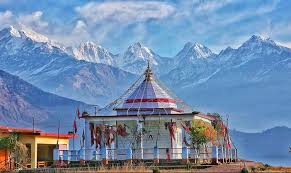
Nanda Devi Temple
Almora, India
- Attend the Nanda Devi Fair (September).
- Enjoy panoramic Himalayan views.
- Explore the temple architecture.
- Learn about Kumaoni traditions.
- Meditate in the peaceful surroundings.
- Offer prayers to Nanda Devi.
Known for:
Description:
Nanda Devi Temple in Almora is a revered shrine dedicated to the patron goddess of the Kumaon region, Nanda Devi. The temple is renowned for its intricate stone carvings and the peaceful ambiance that surrounds it. It's a significant religious and cultural center, drawing devotees and tourists alike. The temple's architecture reflects the traditional Kumaoni style, and its location offers panoramic views of the surrounding Himalayan peaks. The annual Nanda Devi Fair, held in September, is a major event that showcases the region's rich cultural heritage with vibrant processions, folk dances, and traditional music. Visiting the temple provides a glimpse into the spiritual heart of Almora and the deep-rooted faith of the local community. The serene atmosphere and the stunning backdrop make it a must-visit destination for those seeking both spiritual solace and natural beauty.
History:
The history of the Nanda Devi Temple in Almora is deeply intertwined with the Chand dynasty, who ruled the Kumaon region for centuries. The temple is believed to have been established during their reign, although the exact date remains uncertain. Nanda Devi was the family deity of the Chand rulers, and they played a crucial role in promoting her worship throughout the region. The temple has undergone several renovations and expansions over the years, reflecting the changing architectural styles and religious practices. The annual Nanda Devi Fair, which dates back to the Chand era, is a testament to the enduring legacy of the dynasty and their devotion to the goddess. The temple has served as a center for religious and cultural activities, preserving the traditions and beliefs of the Kumaoni people.